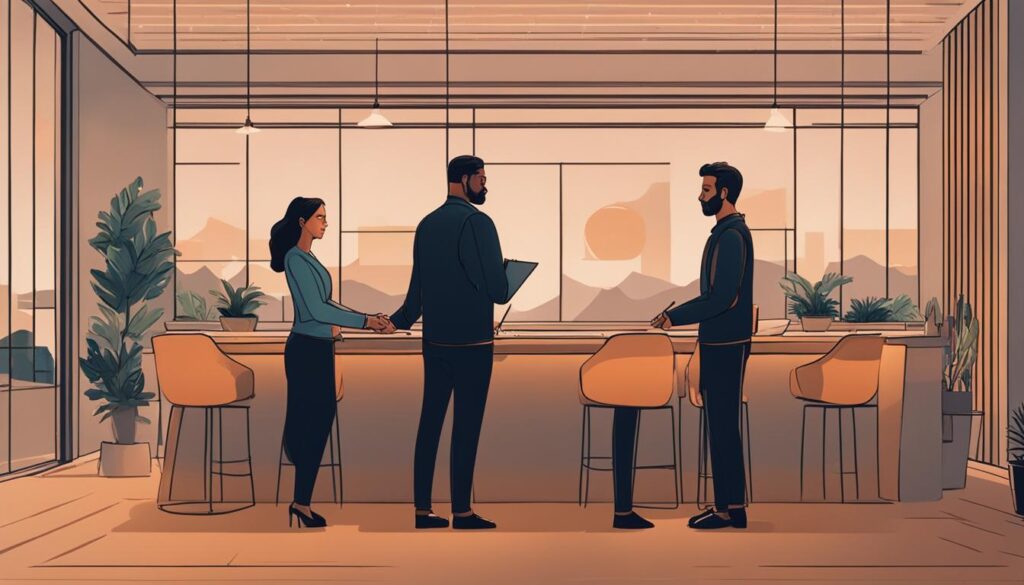Were you aware that around 1.6% of adults in the United States are impacted by borderline personality disorder (BPD)? This data highlights the widespread presence of BPD, underscoring the essential requirement for easily accessible therapy and support options for couples dealing with the challenges of relationships affected by borderline personality disorder.
Borderline Relationships Therapy aims to provide a specialized approach to couples affected by BPD, addressing the unique difficulties they face in maintaining stable and fulfilling relationships. By understanding the impact of BPD on relationships and employing evidence-based therapeutic techniques, this type of therapy offers hope and support for couples seeking to overcome the challenges posed by this complex disorder.
Key Takeaways:
- Approximately 1.6% of adults in the United States are affected by borderline personality disorder (BPD).
- Borderline Relationships Therapy focuses on addressing the specific challenges faced by couples affected by BPD.
- Therapy for borderline relationships can help couples overcome splitting behaviors and intense emotional experiences.
- Establishing boundaries, improving communication skills, and promoting self-care are crucial aspects of couples therapy for BPD.
- Couples therapy offers several benefits, including improved emotional regulation and a stronger overall relationship.
Understanding Borderline Personality Disorder in Relationships
Borderline personality disorder (BPD) is a condition characterized by emotional instability, fear of abandonment, and an unstable sense of self. These traits can significantly impact relationships, leading to conflicts and communication difficulties. In order to provide effective therapy and support for couples affected by BPD, it is essential to understand the unique challenges this disorder presents.
BPD can make it difficult for individuals to maintain stable and healthy relationships. The fear of abandonment may cause them to become clingy or overly dependent on their partner, while their emotional instability can result in frequent mood swings and intense reactions. These unpredictable behaviors can strain the relationship and create a cycle of conflict and turmoil.
In addition, individuals with BPD often struggle with a distorted self-image, which can affect how they perceive and interact with their partner. They may experience sudden shifts in their feelings towards their partner, seeing them as either perfect or entirely flawed. This phenomenon, known as splitting, can lead to misunderstandings, misinterpretations, and emotional distress within the relationship.
“Individuals with BPD often struggle with a distorted self-image, which can affect how they perceive and interact with their partner.”
To address these challenges, couples therapy specifically tailored for BPD can be highly beneficial. This type of therapy focuses on understanding and managing the unique dynamics present in borderline relationships. It aims to help couples develop healthier patterns of communication, emotional regulation, and conflict resolution.
Treatment Options for Borderline Personality Disorder in Couples
When it comes to treating BPD within the context of a relationship, there are several interventions and support options available:
- Couples Therapy: Couples therapy provides a safe space for partners to explore their emotions, understand the impact of BPD on their relationship, and learn effective coping strategies. This therapy can strengthen the emotional bond between partners and improve overall relationship satisfaction.
- Individual Therapy: In addition to couples therapy, individual therapy for each partner is often recommended. This allows individuals to focus on their personal growth, develop skills to manage their symptoms, and address any underlying issues contributing to the relationship challenges.
- Support Groups: Joining a support group specifically for couples affected by BPD can provide a sense of community, validation, and understanding. These groups offer a space to share experiences, gain insights from others in similar situations, and learn from each other’s successes and challenges.
It is important to approach therapy for BPD with empathy, patience, and a willingness to learn. The journey towards healing and building a strong relationship may not always be easy, but with the right support, understanding, and commitment, couples affected by BPD can find hope, stability, and a renewed sense of connection.
The Role of Splitting in Borderline Relationships
Splitting is a defense mechanism commonly observed in individuals with Borderline Personality Disorder (BPD). It is a cognitive distortion that involves seeing oneself and others in extremes of either all good or all bad. This distorted perception can have a significant impact on relationships, causing intense emotional reactions and difficulties in maintaining a balanced view of the partner.
When an individual with BPD engages in splitting, they may quickly shift from idealizing their partner to devaluing them, often in response to perceived abandonment or criticism. This pattern of thinking can lead to rapidly changing emotions and behaviors, creating instability and conflict within the relationship.
For instance, consider a couple where one partner has BPD. When triggered, they may see their partner as completely loving and perfect (all good) but as soon as a perceived flaw or mistake occurs, they may switch to viewing their partner as completely untrustworthy or evil (all bad). This black-and-white thinking can strain the relationship and make it challenging to develop a secure and healthy bond.
It is important to understand that splitting is not a deliberate choice but rather a coping mechanism rooted in deep emotional pain and fear. Individuals with BPD may struggle with self-identity and have difficulty maintaining a consistent view of themselves and others.
To address the challenges posed by splitting in borderline relationships, effective therapy for couples with borderline traits can provide invaluable support. Therapists experienced in working with BPD can assist couples in navigating the complexities of this defense mechanism and help them develop healthier perspectives and coping strategies.
The Impact of Splitting on Borderline Relationships
Splitting can have a profound influence on borderline relationships, impacting various aspects such as:
- Communication: Splitting can create challenges in effective communication between partners. It can lead to misunderstandings, hurtful remarks, and difficulty in resolving conflicts peacefully.
- Emotional Intensity: The constant shifting between extreme emotions can be overwhelming and exhausting for both partners. It can contribute to heightened emotional reactivity and frequent arguments.
- Trust and Stability: Splitting can erode trust and destabilize the relationship. The perception of constant changes in the partner’s character can create doubts and insecurities.
Understanding the impact of splitting on borderline relationships is crucial in providing effective support and therapy options for couples. By addressing this defense mechanism, therapists can help couples develop a more balanced and realistic perspective, fostering healthier communication, trust, and emotional stability.
“Splitting is like wearing tinted glasses that distort the true colors of a relationship. Through therapy and support, couples can learn to remove these glasses and see their relationship with clarity and understanding.”

| Support Options for Couples: | Effectiveness |
|---|---|
| Borderline Relationships Therapy | ✓✓✓✓ |
| Support Groups for Couples with Borderline Personality Disorder | ✓✓✓ |
| Effective Therapy for Couples with Borderline Traits | ✓✓✓✓✓ |
Note: The effectiveness ratings are based on general experiences and may vary depending on individual circumstances and the level of commitment from both partners.
Overcoming Splitting with Couples Therapy
Couples therapy for borderline personality disorder (BPD) focuses on helping individuals overcome splitting behaviors and developing healthier ways of perceiving and engaging with their partner. Splitting, a common defense mechanism in individuals with BPD, involves seeing oneself and others as either all good or all bad. This black-and-white thinking can create emotional turmoil and strain in relationships.
Therapy for BPD couples aims to address the underlying emotional issues that contribute to splitting. By exploring the origins of splitting behaviors and fostering self-awareness, couples can develop a more balanced view of their relationship. The therapist guides them in challenging distorted perceptions, managing intense emotions, and building effective communication skills.
Couples therapy for BPD paves the way for:
- Overcoming a black-and-white perspective: Therapy helps partners recognize and challenge extreme beliefs about themselves and each other. By acknowledging shades of gray, couples can develop a more nuanced understanding of their relationship.
- Enhancing emotional regulation: The therapy provides tools and techniques for managing intense emotions. Learning to identify triggers, cultivating self-soothing strategies, and practicing effective coping mechanisms enable couples to navigate emotional challenges more constructively.
- Improving communication and empathy: Therapists facilitate open and honest dialogue, helping couples express their needs and concerns. By practicing active listening and validating each other’s experiences, partners can foster understanding and empathy.
- Building a stronger foundation: Couples therapy helps partners strengthen their bond by working through conflicts, addressing past trauma, and establishing healthier relationship patterns. By developing insight and strategies for managing challenging situations, couples can create a more stable and supportive partnership.
“Couples therapy provided us with a safe space to explore the underlying dynamics of our relationship. Through therapy, we gained a deeper understanding of how splitting behaviors impacted our interactions and learned strategies to foster a more balanced perspective. It’s been transformative for our relationship.” – Amy and Chris, a couple who underwent therapy for BPD.
Couples therapy for BPD is designed to assist partners in fostering a more solid and resilient connection. By addressing splitting behaviors and the emotional challenges associated with BPD, therapy offers hope and support for couples seeking to build a healthier and more fulfilling relationship.

Establishing Boundaries and Communication
A key aspect of couples therapy for BPD is the establishment of clear boundaries and the improvement of communication skills. By focusing on these areas, couples can create a solid foundation for their relationship and enhance their emotional well-being.
Improving communication skills is essential for couples with BPD. It involves facilitating open and honest conversations, actively listening to one another, and expressing thoughts and emotions effectively. By nurturing these skills, couples can foster understanding and empathy, leading to healthier and more fulfilling relationships.
Active Listening
Active listening is a crucial aspect of effective communication in relationships. It involves fully focusing on the message being shared, without interrupting or formulating a response prematurely. Active listening demonstrates respect, validation, and empathy towards one’s partner, fostering a deeper sense of connection and understanding.
Setting Boundaries
Establishing clear boundaries is vital in any relationship, particularly when one or both partners have BPD. Boundaries help define individual needs, desires, and limits, ensuring that both partners feel respected and valued. By setting boundaries, couples can avoid misunderstandings and create a safer and more secure emotional environment.
“Effective communication is the foundation of any healthy relationship. By actively listening and setting boundaries, couples can build a solid framework for understanding, empathy, and support.”
Resolving Conflicts
Conflict is a natural part of any relationship, but it can be particularly challenging for couples with BPD. Learning healthy and respectful ways to resolve conflicts is vital for maintaining a harmonious and long-lasting relationship. Couples therapy provides a supportive environment to learn conflict resolution skills, such as compromising, finding common ground, and seeking win-win solutions.
Support from Couples Support Groups
Joining couples support groups specifically tailored to BPD can prove immensely beneficial. These groups provide a safe space for couples to share their experiences, learn from others, and gain valuable insights into healthy relationship dynamics. Couples support groups offer emotional support, encouragement, and valuable strategies for navigating the unique challenges faced by couples with BPD.
| Benefits of Establishing Boundaries and Improving Communication Skills in Couples Therapy: |
|---|
| Promotes understanding and empathy |
| Enhances emotional connection and intimacy |
| Reduces conflicts and misunderstandings |
| Creates a secure and supportive emotional environment |

Encouraging Professional Help and Self-Care
When it comes to managing borderline personality disorder (BPD) in couples, seeking professional help and practicing self-care are crucial steps towards growth and healing. Therapy specifically tailored to treating BPD, such as dialectical behavior therapy (DBT), can provide individuals and couples with the necessary tools to navigate the challenges they face. Additionally, incorporating self-care activities into everyday life can contribute to better symptom management and overall well-being.
Therapy for borderline personality disorder in couples offers a supportive environment where both partners can explore their emotions, develop effective coping strategies, and foster healthier patterns of communication. By addressing the unique needs of a couple impacted by BPD, therapy aims to strengthen the relationship and enhance the overall quality of life.
To supplement therapy, couples may also benefit from joining support groups for couples with borderline personality disorder. These groups provide a safe space for couples to share their experiences, learn from one another, and gain support from individuals who truly understand the unique challenges they face.
While professional help is essential, promoting self-care activities is equally important. Engaging in regular exercise, practicing relaxation techniques such as deep breathing or meditation, and pursuing hobbies and interests can all contribute to better self-awareness and symptom management. Taking time to prioritize self-care not only benefits individuals with BPD but also strengthens the foundation of the relationship, enabling partners to better support one another.
Benefits of Professional Help and Self-Care:
- Gain insight into BPD and its impact on the relationship
- Learn effective coping strategies and communication skills
- Develop a support network through therapy and support groups
- Improve emotional regulation and symptom management
- Enhance overall well-being and strengthen the relationship

| Professional Help | Self-Care |
|---|---|
|
|
By embracing both professional help and self-care, couples affected by borderline personality disorder can take proactive steps towards building a stronger and more resilient relationship. It is important to remember that seeking help is not a sign of weakness, but rather an empowering choice that can lead to growth and improved well-being for both individuals and the relationship as a whole.
Maintaining Your Emotional Well-being
While supporting a partner with borderline personality disorder (BPD), it is essential to prioritize our own emotional well-being. The journey of supporting a loved one with BPD can be challenging, and taking care of ourselves is vital for maintaining a balanced and healthy relationship.
Here are some key strategies to maintain our emotional well-being:
Set Realistic Expectations
Recognize that supporting a partner with BPD can be emotionally demanding. It is important to set realistic expectations for ourselves, understanding that we cannot solve all their challenges or make everything better. By acknowledging our limits, we prevent feelings of guilt or burnout.
Build a Support Network
Seeking support from others who understand our experiences can make a significant difference. Connect with friends, family members, or online communities to share our thoughts, concerns, and frustrations. Building a support network provides a space for validation, empathy, and learning from others who have walked a similar path.
Engage in Self-Care Activities
Make time for activities that bring us joy, relaxation, and fulfillment. Engaging in self-care activities can help recharge our emotional batteries and reduce stress. Whether it’s practicing mindfulness, pursuing a hobby, or spending quality time with loved ones, prioritize activities that nourish our well-being.
“Taking care of ourselves is not selfish; it is essential. We cannot pour from an empty cup. By prioritizing our emotional well-being, we can show up as a stronger and more supportive partner.”
Seek Therapy for Ourselves
If needed, it is essential to consider individual therapy or counseling for our own mental health support. Therapy provides a safe and confidential space to explore our emotions, challenges, and personal growth. A therapist can offer guidance, tools, and techniques to navigate the complexities of supporting a partner with BPD.
Remember, by prioritizing our own emotional well-being, we are better equipped to support our partner and maintain a healthy relationship. Taking care of ourselves is not selfish; it is an act of love and compassion for both our partner and ourselves.

“Emotional well-being is not a luxury; it is a necessity. By taking care of ourselves, we can create a healthier and more fulfilling relationship.”
Foster Empathy and Patience
Cultivating empathy and patience is crucial when supporting a partner with borderline personality disorder (BPD). Understanding the unique challenges faced by individuals with BPD and the impact it has on their behaviors can greatly enhance the quality of the relationship. By embodying empathy and patience, partners can navigate the ups and downs of the disorder and maintain a strong and supportive bond.
Educating ourselves about BPD is an essential first step in fostering empathy. Taking the time to learn about the disorder, its symptoms, and its effects on relationships can help us better understand our partner’s experiences. It allows us to view their behaviors through a compassionate lens, recognizing that their actions are influenced by their inner struggles.
Active listening is another vital aspect of cultivating empathy. By actively listening to our partner’s thoughts and feelings, we show them that we value their perspective. This validates their experiences and fosters a sense of understanding and connection. It is important to set aside our own biases and truly listen, seeking to comprehend rather than judge or criticize.
Additionally, patience is paramount when supporting a partner with BPD. The disorder often involves intense emotions and mood swings, which may sometimes lead to impulsive or irrational behaviors. By staying patient during these challenging moments, we provide a safe space for our partner to express themselves without fear of judgment or rejection.
“Patience is not the ability to wait, but the ability to keep a good attitude while waiting.” – Joyce Meyer
Benefits of Cultivating Empathy and Patience
By fostering empathy and patience, couples can experience numerous benefits in their relationship:
- Improved communication and understanding
- Increased emotional connection
- Reduced conflicts and misunderstandings
- Greater empathy towards each other’s experiences
- Enhanced ability to navigate challenges together
Empathy and patience are essential keys to building a resilient and supportive relationship when one or both partners have BPD. It allows us to meet our partner where they are, providing the understanding and patience they need to thrive.
Key Strategies for Fostering Empathy and Patience
| Strategies | Benefits |
|---|---|
| Education about BPD | Enhanced understanding of partner’s experiences |
| Active listening | Improved communication and emotional connection |
| Practicing patience during difficult moments | Reduced conflicts and increased emotional safety |
By incorporating these strategies into our relationship, we can create a supportive environment that fosters empathy and patience for our partner with BPD. Together, we can navigate the challenges that arise, build a stronger bond, and cultivate a relationship filled with understanding and love.

Couple Therapy as a Treatment Option for BPD
When it comes to treating borderline personality disorder (BPD), couple therapy can be a valuable and effective option. By addressing the complexities of BPD within the context of the relationship, therapy provides a supportive environment that helps couples build healthier patterns of communication, emotional regulation, and conflict resolution. It offers a unique opportunity for both partners to explore and understand the impact of the disorder on their relationship.
In couple therapy for BPD, the therapist works closely with the couple to identify and address the specific challenges they face. This may include difficulties in managing intense emotions, fears of abandonment, and unstable self-identity. With the guidance of a skilled therapist, couples can learn strategies to overcome these challenges and develop a more stable and fulfilling relationship.
One of the key benefits of couple therapy for BPD is its focus on improving communication skills. Couples learn effective techniques for expressing their needs, listening actively, and resolving conflicts in a healthy and respectful manner. By enhancing their communication skills, couples can establish clearer boundaries and foster a deeper understanding of each other’s experiences.
“Couple therapy allows us to address our individual issues while also unpacking how they impact our relationship. It has given us the tools to navigate the challenges of BPD and build a stronger, more supportive partnership.”
Additionally, couple therapy can help individuals with BPD develop essential emotional regulation skills. Through various therapeutic techniques, couples learn to identify and manage intense emotions, reducing impulsive behaviors and promoting overall emotional stability. This newfound emotional regulation not only benefits the individual with BPD, but also contributes to the overall health and well-being of the relationship.
Furthermore, couple therapy provides a space for couples to address the unique dynamics of their relationship that may be influenced by BPD. The therapist can guide couples in exploring underlying patterns, such as fear of abandonment or distrust, and help them develop strategies to overcome these challenges. This process fosters empathy and understanding between partners, strengthening their bond and creating a more supportive and resilient relationship.
Overall, couple therapy offers a holistic approach to treating BPD by addressing the disorder within the context of the relationship. It provides a safe and nurturing environment for couples to grow together, gaining valuable insights and skills along the way.

In the next section, we will explore the specific benefits that couple therapy can bring to individuals with BPD and their partners, as well as the potential challenges that may arise. Stay tuned!
The Benefits of Couple Therapy for BPD
Couple therapy can offer significant advantages for individuals with borderline personality disorder (BPD) and their partners. With its focus on improving emotional regulation, enhancing communication skills, fostering empathy, and strengthening the overall relationship, therapy can provide a valuable path towards healing and growth.
Here are some key benefits of couple therapy for BPD:
- Improved Emotional Regulation: Couple therapy helps individuals with BPD develop effective strategies for managing their emotions, reducing impulsive behaviors, and promoting emotional stability within the relationship. Through therapeutic techniques such as dialectical behavior therapy (DBT), couples learn practical skills to regulate their emotions and cope with challenging situations.
- Enhanced Communication Skills: Effective communication is essential for any relationship, but it is particularly crucial when one or both partners have BPD. Couple therapy focuses on improving communication patterns, promoting active listening, fostering empathy, and teaching constructive conflict resolution strategies. This enables partners to express their needs and feelings in a healthy and productive manner.
- Increased Empathy and Understanding: BPD can create misunderstandings, intense emotional reactions, and relationship difficulties. Couple therapy helps partners develop a deeper understanding of the disorder, its impact on behavior, and its associated challenges. This understanding fosters empathy, compassion, and a greater sense of connection between partners.
- Stronger Overall Relationship: By addressing the unique dynamics of a relationship impacted by BPD, therapy can help couples build a more solid, resilient, and supportive partnership. It provides a safe space for partners to explore their individual and relational vulnerabilities, heal past wounds, and create a healthier foundation for their future together.
In couple therapy for BPD, both partners actively participate in the treatment process with the guidance of a trained therapist specializing in BPD. Through a combination of individual and joint sessions, couples gain valuable insights, learn practical skills, and work towards developing a more fulfilling and satisfying relationship.
Example Table: Comparing the Benefits of Couple Therapy for BPD
| Benefit | Explanation |
|---|---|
| Improved Emotional Regulation | Emotional regulation techniques, such as DBT, are taught to help individuals manage intense emotions and impulsivity. |
| Enhanced Communication Skills | Partners learn effective communication strategies, active listening, and conflict resolution techniques. |
| Increased Empathy and Understanding | Therapy fosters a deeper understanding of BPD, leading to greater empathy, compassion, and connection. |
| Stronger Overall Relationship | The dynamic of the relationship is transformed, creating a more solid, resilient, and supportive partnership. |
To visualize the benefits further, here is an image highlighting the transformation that couple therapy can bring:

Couple therapy provides an invaluable opportunity for couples affected by BPD to work together towards a healthier, more fulfilling relationship. It is important for individuals with BPD and their partners to explore the support options available and consider therapy as a positive step towards growth and healing.
Challenges and Considerations in Couple Therapy for BPD
Couple therapy for borderline personality disorder (BPD) is not without its challenges. It requires therapists to navigate through intense emotions, conflicts, and individual and relational vulnerabilities. However, with the right knowledge and approach, these challenges can be effectively addressed, leading to meaningful progress in therapy.
One of the primary considerations in couple therapy for BPD is understanding the impact of the disorder on relationships. Therapists need to be knowledgeable about BPD and its symptoms, as well as how these symptoms manifest in the context of a romantic partnership. This understanding allows therapists to provide tailored guidance and support that address the unique challenges faced by couples.
In creating a safe and supportive therapeutic environment, it is important for therapists to establish trust and open communication with both partners. This enables couples to express their emotions, concerns, and expectations freely. With a non-judgmental and empathetic approach, therapists can help couples navigate the complexities of their relationship and work towards building a stronger foundation.
Support groups specific to BPD can also be a valuable resource for couples in therapy. These groups offer a space where couples can connect with others who are going through similar experiences. Sharing insights, challenges, and coping strategies with individuals who understand the unique dynamics of BPD relationships can provide couples with additional support and understanding.
Overcoming Challenges Through Strength and Understanding
Addressing the challenges in couple therapy for BPD requires a combination of strength, patience, and understanding. Therapists play a crucial role in guiding couples through the process of emotional regulation, conflict resolution, and developing healthier patterns of communication.
By fostering empathy and creating an environment of mutual respect, therapists can help couples overcome the obstacles that BPD presents. This can involve developing strategies for managing intense emotions, setting boundaries, and promoting effective communication. Through the guidance of trained professionals, couples can learn to navigate their way towards a healthier and more fulfilling relationship.
Couple therapy for BPD requires therapists to be knowledgeable about the disorder, create a safe and supportive environment, and consider resources like support groups specific to BPD. Overcoming challenges in therapy involves strength, patience, and understanding, ultimately leading to healthier patterns of communication and a stronger bond between partners.

| Challenges | Considerations |
|---|---|
| Managing intense emotions | Therapists should provide strategies for emotional regulation and coping mechanisms to help couples navigate the intensity of BPD. |
| Navigating conflicts | Therapists can guide couples in resolving conflicts in a healthy and constructive manner, promoting effective communication and conflict resolution skills. |
| Addressing individual and relational vulnerabilities | Therapists must create a supportive environment where individuals can explore and address their personal vulnerabilities, as well as the vulnerabilities within their relationship. |
Couple therapy for BPD is a challenging but transformative journey for couples. With the right support, understanding, and commitment to therapy, couples can grow stronger, improve their communication and overall well-being, and build a more stable and fulfilling relationship.
Conclusion
Couple therapy is a powerful resource for couples grappling with borderline personality disorder (BPD). It provides a safe and supportive space to address the unique challenges that arise in these relationships, enabling couples to cultivate healthy communication, emotional regulation, and understanding. Through therapy, couples affected by BPD can find hope, support, and the tools necessary to navigate the complexities of their relationships.
By working with a skilled therapist, couples can develop effective strategies to manage the impact of BPD on their relationship dynamics. Therapy offers a roadmap to improved communication, emotional stability, and a deeper connection between partners. It emphasizes the cultivation of healthy patterns and fosters an environment of empathy, patience, and support.
For those seeking support options for couples affected by BPD, couple therapy is a highly recommended choice. It not only helps couples address their immediate concerns, but it also equips them with the skills and knowledge to build a resilient, long-lasting partnership. Through therapy, couples can overcome the obstacles posed by BPD and forge a path towards a healthier and happier future together.
FAQ
What is couples therapy for borderline relationships?
Couples therapy for borderline relationships is a form of therapy specifically designed to address the challenges faced by couples affected by borderline personality disorder (BPD). It aims to improve communication, emotional regulation, and overall relationship satisfaction.
How can borderline personality disorder impact relationships?
Borderline personality disorder can impact relationships by causing emotional instability, fear of abandonment, and difficulties with self-identity. These traits can lead to conflicts, communication difficulties, and intense emotional reactions in relationships.
What is splitting, and how does it affect borderline relationships?
Splitting is a defense mechanism commonly observed in individuals with borderline personality disorder. It involves seeing oneself and others in extremes of either all good or all bad. Splitting can lead to conflicting perceptions of one’s partner and difficulties in maintaining a balanced view of the relationship.
How does couples therapy help individuals overcome splitting behaviors?
Couples therapy for BPD helps individuals overcome splitting behaviors by addressing the underlying emotional issues that contribute to this defense mechanism. Through therapy, individuals can develop healthier ways of perceiving and engaging with their partner, leading to more stable and supportive relationships.
What are the important aspects of communication in couples therapy for BPD?
Couples therapy for BPD emphasizes the establishment of clear boundaries and improvement of communication skills. This includes facilitating open and honest communication, active listening, setting boundaries, and resolving conflicts in a healthy and respectful manner.
What other forms of professional help are recommended for couples with BPD?
In addition to couples therapy, individuals with BPD and their partners may benefit from individual therapy tailored to treating BPD, such as dialectical behavior therapy (DBT). Support groups specific to BPD can also offer additional resources and understanding.
How can I maintain my emotional well-being while supporting a partner with BPD?
To maintain your emotional well-being while supporting a partner with BPD, it is important to prioritize self-care activities, such as exercise, relaxation techniques, and engaging in hobbies. Building a support network and seeking therapy for yourself if needed are also crucial components of self-care.
How can I foster empathy and patience when supporting a partner with BPD?
Foster empathy and patience when supporting a partner with BPD by educating yourself about the disorder, practicing active listening, and understanding the impact of BPD on behaviors. These qualities can help navigate the challenges and maintain a strong and supportive bond.
Can couple therapy be an effective treatment option for individuals with BPD?
Yes, couple therapy can be an effective treatment option for individuals with BPD. By addressing the complexities of BPD within the context of the relationship, therapy can help couples build healthier patterns of communication, emotional regulation, and conflict resolution.
What are the benefits of couple therapy for individuals with BPD?
The benefits of couple therapy for individuals with BPD include improved emotional regulation, enhanced communication skills, increased empathy, and a stronger overall relationship. It provides a supportive environment for both partners to explore and understand the impact of the disorder on their relationship.
What are the challenges and considerations in couple therapy for BPD?
Couple therapy for BPD can present challenges, such as managing intense emotions, navigating conflicts, and addressing individual and relational vulnerabilities. It is important for therapists to be knowledgeable about BPD and its impact on relationships and to create a safe and supportive therapeutic environment for couples.
How can a couple benefit from therapy for borderline relationships?
Couples affected by borderline relationships can benefit from therapy by addressing specific challenges related to BPD, improving communication and emotional regulation skills, and building a healthier and more fulfilling relationship. Therapy provides a supportive space for couples to navigate the complexities of borderline relationships.









